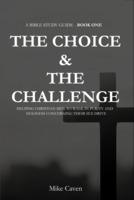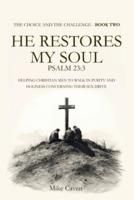Therefore confess your sins to each other
and pray for each other so that you may be healed.
The prayer of a righteous man is powerful and effective.
James 5:16 NIV
* * * * *
The Epistle of James has much to teach us about the application of the principles, precepts and promises of God to our everyday Christian lives. It has often been called the
“guide to practical Christianity”.
One principle the apostle gives us though may hardly seem practical, and indeed somewhat incredible. It reads as follows in James 5:16.
“The effective prayer of a righteous man can accomplish much.”
(New American Standard Bible)
It is given in the context of praying for the physically ill, but in the larger context of the epistle and the Scripture overall it appears safe to apply this to other situations as well.
There are two words in this statement that must be taken into consideration. Both are adjectives, one describing prayer and the other the one praying. These words are
script”>
“effective” and “righteous”.
Without a proper understanding of these words, this principle of Scripture can easily be misunderstood and misapplied.
It would seem obvious that everyone who prays wants their prayers to be “effective”, but in all honesty, for most people they don’t always appear to be. This is troublesome for many and a challenge to their faith in God and His Word. Some just give up, but others struggle with
“Why?”
In searching for the answer, some may look to this verse from James and think they have found it, but then are even more unsettled! The verse maintains that for the principle to apply, the one praying must be a “righteous” person, and since their prayers often seem ineffective, they assume they must NOT be a righteous person. But is this a valid conclusion to arrive at? While it may seem so at first, it is definitely worthwhile to explore this further on the basis of the Scripture basis for identifying a righteous person.
From God’s perspective, who can be truly called righteous? To answer this, we must start by looking at those whom Scripture clearly identifies as “unrighteous”. While we may jump to the conclusion that these must be especially wicked and vile people, in fact many are what we would call “upstanding citizens”. The most “unrighteous” folks identified in scripture are the self-righteous! Isaiah tells the people of Israel
“For all of us have become like one who is unclean,
and all our righteous deeds are like a filthy garment.”
Scripture makes it clear that the pathway to righteousness begins with our understanding that in ourselves we are not, and can never be, righteous!
Pride makes this difficult.
Jesus stressed this to the self-righteous of His day. In the parable of the Pharisee and the tax collector, who both went to the Temple to pray, we see this illustrated.
The Jewish society of that day revered the Pharisees as truly outstandingly godly and “righteous” people, while the tax collectors were considered about as wicked and “unrighteous” as anyone could be. This parable then was somewhat shocking to the people hearing it, for the “hero” of the story was the humble and repentant tax collector, and the “villain” was the proud and self-righteous Pharisee!
Jesus made it clear that the self-righteous will never be acceptable to God,
and none can obtain the righteousness of God by their own efforts.
* * * * *
Who then are the righteous?
Are there any?
* * * * *
The Apostle Paul in his letter to the Romans quotes from the Psalms
“There is none righteous,
not even one!”
So both the Old and New Testaments affirm this absolute pronouncement.
What then, does this make the promise in James’ epistle moot?
Is it empty at best and a cruel falsehood at worst?
To understand why the answer to these questions is “no”, we must again look to Scripture and we will discover that Scripture indeed identifies some people as righteous. Many of these are those we see living a godly and lawful life, but there is one man in particular who does NOT exhibit what we would consider “righteous” behavior, but is nevertheless called in Scripture a “righteous” man.
This is Lot, the nephew of Abraham, who went to live in Sodom and became enmeshed in that grossly wicked and godless society. From the Genesis account of Lot and his behavior, we get no sense that he was “righteous”, but the apostle Peter tells us otherwise (2 Peter 2:7).
Peter gives us two points of evidence to support this.
First, that God rescued Lot from Sodom and then that Lot was oppressed by the cesspool he was wallowing in.
Like David who was an adulterer, a murderer and acted treacherously to one of his most devoted subjects, Lot apparently had at some level a heart for God. While neither of these men acted consistently in what could be said to be a righteous manner, they were apparently seen as “righteous” by God.
How could this be?
A story from the prophet Zechariah and a truth expounded by the Apostle Paul help us to answer this.
In the third chapter of the book of Zechariah a scene is described in which the high priest Joshua (representing the people of God) is standing before the angel of the LORD (the pre-incarnate Christ) and Satan. Satan is accusing Joshua. The LORD rebukes Satan and calls Joshua
“a brand plucked from the fire”.
In other words, Joshua, again representing the people of God, was chosen and “saved” by God. Joshua, however, was dressed in filthy garments.
This represented his self-righteousness (Isaiah 64:6). The LORD commanded that the filthy garments be removed from Joshua and that he be clothed in clean and “festal” robes”! God then proclaims that Joshua’s iniquity has been removed and admonishes him to now live accordingly.
One very important thing to notice is that God is the active person here and NOT Joshua. The clean robes, which represent righteousness, were “put on” to Joshua by God. This principle is summarized by the apostle Paul with these words
“He (God) made Him (Jesus)
who knew no sin to be sin on our behalf,
so that we might become the righteousness of God in Him.”
So if we are “in Christ,” we have had the filthiness of our own righteousness taken off and
we take on the perfectly pure and clean righteousness of Christ!
No one can be more righteous than that!
* * * * *
At this point we have established that if we are “in Christ” we are indeed righteous before God, we must now consider what makes an
“effective” prayer.
Notice that the passage claims that an effective prayer can accomplish much, so the word “effective” must refer to the prayer itself and not its consequences.
If the prayer is “effective”, it can accomplish much.
The Lord Jesus helps us out here by responding to a request from his disciples.
In the eleventh chapter of the Gospel of Luke the disciples ask
“Lord teach us to pray”
Jesus responded with what is now known as the
“Lord’s Prayer”.
It is, in fact, really the
“disciples prayer”,
for it was given to, and for, them (and by extension, us).
This is a model of an “effective” prayer and is recorded in Luke 11:2-4. It begins with the recognition that the one praying has an intimate relationship with
God Father
and continues with an acknowledgement and proclamation by the praying one of the holiness of God and His name
hallowed be Thy name.
It then proceeds with an acclamation of the praying one’s willingness and desire to be subject to the kingdom of God
Thy kingdom come.
Only then is a petition appropriately made, and it is one for our needs, not our wants
give us each day our daily bread
and is followed by the admission of our need for forgiveness and our willingness to forgive others
forgive us our sins,
for we ourselves also forgive everyone who is indebted to us.
It concludes in this version (there is a parallel version in Matthew chapter 6) with a plea to help us avoid temptation, the implication being that that might lead us to sin
lead us not into temptation.
That’s it, just short of 40 words, but this is the model we should follow if we want our prayers to be
“effective”.
So if we desire to pray
“effectively”,
we must begin by establishing our relationship with God.
If we don’t have one, then we are not “righteous”, and the promise of James will not apply to us. Then we must be aware of, and subjected to, the holiness and sovereignty of God. We may then petition for our needs, but must also remember our own sinfulness, the forgiveness God has extended to us, and His expectation that we do the same for others.
Finally,
we must recognize our frailty, and pray for protection from that which would prey on the weaknesses of our flesh.
This then describes an
“effective” prayer.
James declares that it can accomplish much, but considering what we have discovered from Scripture about prayer it seems safe to believe it will.
Just how much and in what manner we may never fully realize in this life, but in Heaven all will be manifested and revealed, and we may be amazed at “our” accomplishments!
* * * *
* * *
* *
*
* * * * *

